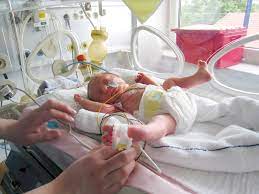Preterm Labor
Also known as PREMATURE LABOR
Preterm labor is a condition in which labor begins before the end of the 37th week of pregnancy. It is one of the most common and serious complications associated with childbirth and can have devastating consequences for both mother and baby. Preterm labor is a leading cause of newborn death and can result in long-term developmental delays, breathing difficulties, vision problems, brain abnormalities, cerebral palsy, hearing impairments and other lifelong disabilities. In addition to its physical effects, preterm labor can also take an emotional toll on families as they grapple with their new normal. Although there are treatments available to help manage preterm labor, research suggests that preventing it from happening in the first place is the most effective form of treatment. This involves regular monitoring throughout pregnancy to identify any risk factors that could lead to preterm labor such as high blood pressure or smoking during pregnancy. Other preventative measures include maintaining a healthy lifestyle and seeking medical care if any signs or symptoms arise during pregnancy. Please keep reading for details on the following topics:
Causes of preterm labor
Signs of preterm labor
Management of preterm labor
What to do if one is experiencing contractions before 37 weeks

PRETERM LABOR
The initiation of labor between the 24th and 37th week of a pregnancy
Contractions, pelvic pressure, pain to the abdomen and lower back
Abdominal cramping that is not relieved by rest, drinking fluids or laying down
CAUSES OF PRETERM LABOR
Early separation of the placenta from the womb
Maternal infection
Weak cervix
Use of alcohol and drugs during the pregnancy
Rupture of membranes
SIGNS OF PRETERM LABOR
It is important to know when to seek urgent medical care, as delaying appropriate treatment can lead to further health complications. If you experience any of the following symptoms, you should seek medical help immediately. If you have any doubts about whether you should seek medical care, it is always better to err on the side of caution and consult with your doctor.
Abdominal cramping or contractions
Unusual increase in vaginal discharge
Pressure to the pelvic region
Unexplained fever

MANAGEMENT OF PRETERM LABOR
Try to delay the birth with medicine
Use antibiotics to treat or prevent infection
Administer medication to help towards development of the baby’s lungs
Delay birth until baby is mature enough by allowing the pregnancy to continue
Allow the mother to deliver if there is a risk to mother or baby
Administering IV fluids to stop contractions
Pain medication
Antibiotics- to help prevent or treat infection.
Medications to help develop the baby’s lungs
Medications to stop preterm labor
Cervical cerclage- placing stitches to help close the cervix
IF EXPERIENCING CONTRACTIONS BEFORE 37 WEEKS
Stop all activity and rest
Drink at least 3 glasses of fluids
Keep the bladder empty
Lay down on the left side
Monitor
If the symptoms persist for over the next hour seek urgent medical care
Disclaimer: The information provided in this content is for general informational purposes only. It is not intended as medical or healthcare advice, diagnosis, or treatment. Always seek the advice of a qualified healthcare professional with any questions you may have regarding a medical condition or healthcare decisions.

